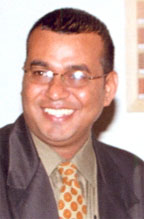– over ‘pipe dream’ statement on Guyana’s food production capacity
Minister Robert Persaud said yesterday that the Barbados Agricultural Society (BAS) official who referred to Guyana’s ability to produce food for the Caribbean as pipe dream, should not disregard facts and figures about Guyana’s capability and avoid embarrassment.
The agriculture minister stressed that the administration has invested heavily to develop Guyana’s capacity as a major producer and exporter of food.
According to a Barbados Nation report published online yesterday, while speaking at a press conference on Thursday at the BAS headquarters in St Michael, BAS CEO James Paul said that the notion that Guyana can feed the Caribbean is nothing more than a ridiculous pipe dream.

Paul said that it came down to a matter of what could be grown where. “We have to be practical,” he was quoted as saying. “These things sound nice, but let us admit Guyana’s soils are not equipped to produce every single food item.”
He said he believed Guyana can produce strategic foods which can benefit that country such as cassava for animal feed. In addition, Paul said, Barbados’s soils were ideal for crops such as watermelons and carrots which he said had “excellent taste profiles” but it was a pipe dream to think one place could feed everyone adequately.
“You don’t want a situation of putting all your eggs into one basket. I think that would be ridiculous. Most agriculturalists would tell you that agricultural production in Guyana is confined to the alluvial belt, which is mostly along the coast,” Paul said. He added that as one goes inland within Guyana; the soils are less fertile, noting that the cost of production would increase as a result.
Responding to the report, Persaud said that most of the local agricultural production comes from a narrow coastal strip where a large part of the population resides.
But he said there still remained thousands of acres of fertile land in addition to the vast amounts of coastal lands which can be developed such as the Canje basin. He said that contrary to Paul’s assertion, there are many areas of the hinterland comprising thousands of acres that consist of class 1 soils excellent for fruits and vegetables.
Persaud also stated that the sparsely populated Rupununi and intermediate savannahs, comprising millions of acres are suitable for certain crops, as Brazil with similar conditions has realized, but need to be carefully managed.
Under the Low Carbon Development Strategy, he said, the administration will look at deploying resources to develop infrastructure and access these “new” agricultural land for food and fuel production.
Paul stated that another factor influencing agriculture production was the worldwide concern about the reduction of farmland and with the world’s population increasing, there would be an increased demand for food, noting that the improvements in technology are not keeping pace with the need to improve productivity.
Persaud said government has invested heavily to develop Guyana’s capacity as a major producer and exporter of food. The minister stated that some of these areas includes massive investment in drainage and irrigation of agricultural lands, export facilities in accordance with sanitary and phytosanitary standards, research and technology to increase the variety of agricultural commodities and diversity within the agricultural production system.
To this effect, he noted, the Ministry of Agriculture is currently implementing a US$21.9 million Agricultural Export Diversification Programme and a US$7 million Rural Enterprise and Agricultural Development Pro-gramme.
In addition, Persaud said, a US$20 million Agricultural Support Services Programme and a US$5 million Conservancy Adaptation Project are all part of the administration’s investment within the agriculture sector to enhance efficiency, productivity and competitiveness of traditional and non-traditional agriculture.
He said these and other plans by the Ministry of Agriculture are to ensure that Guyana maintains its food secure status and takes advantage of the opportunities of the global food crisis. Further, the minister said, government is reviewing one dozen proposals for agro-energy/bio-fuels production of 250,000 acres of land, while another 125,000 acres is available for investment in livestock, other crops and agro-processing.
Persaud said that Paul is a respected Caribbean agriculturist who has earned many friends in Guyana.
He said the Barbadian official has visited the Guyana on several occasions, attending a range of meetings and is greatly admired for his courageous positions and enlightened statements as an agriculturist.
However, his recent pronouncements “are surprising to say the least”, Persaud said noting that since Paul’s interactions with Guyanese soil scientists such as Professor Nyron Ahmad, Dr Frank Gumbs and Dr Leslie Simpson and others would have contributed toward his understanding of the great potential Guyana has for agricultural production.
The agriculture minister said he could only surmise that when Paul spoke, “he had neglected to take off his hat as a relatively new parliamentarian representing the now ruling Democratic Labour Party”.
However he said, Paul’s enthusiasm as a politician exhorting his constituency to work towards greater production and food security, “is understandable among all of us politicians”.
Persaud also listed some 73 fresh and some 54 processed items which Guyana has produced and exported over the past four years, including avocado, awara, bora, breadfruit, achar, cassava starch, coconut oil, plantain flour, seasonings and spices.
He said the abundance of fresh water supply cannot be questioned since the Ministry of Agriculture is moving to improve water management. He said that the aforementioned are a few facts Paul should contemplate and be reassured that Guyana is “poised to be the breadbasket of the Caribbean”.





